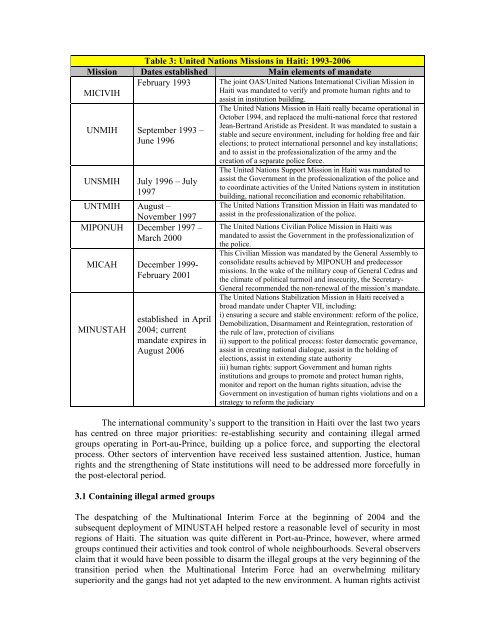case study Haiti - United Nations Development Programme
case study Haiti - United Nations Development Programme
case study Haiti - United Nations Development Programme
Create successful ePaper yourself
Turn your PDF publications into a flip-book with our unique Google optimized e-Paper software.
Table 3: <strong>United</strong> <strong>Nations</strong> Missions in <strong>Haiti</strong>: 1993-2006<br />
Mission Dates established Main elements of mandate<br />
February 1993 The joint OAS/<strong>United</strong> <strong>Nations</strong> International Civilian Mission in<br />
MICIVIH<br />
<strong>Haiti</strong> was mandated to verify and promote human rights and to<br />
assist in institution building.<br />
The <strong>United</strong> <strong>Nations</strong> Mission in <strong>Haiti</strong> really became operational in<br />
October 1994, and replaced the multi-national force that restored<br />
Jean-Bertrand Aristide as President. It was mandated to sustain a<br />
UNMIH September 1993 –<br />
stable and secure environment, including for holding free and fair<br />
June 1996<br />
elections; to protect international personnel and key installations;<br />
and to assist in the professionalization of the army and the<br />
creation of a separate police force.<br />
UNSMIH July 1996 – July<br />
1997<br />
UNTMIH August –<br />
November 1997<br />
MIPONUH December 1997 –<br />
March 2000<br />
MICAH December 1999-<br />
February 2001<br />
MINUSTAH<br />
established in April<br />
2004; current<br />
mandate expires in<br />
August 2006<br />
The international community’s support to the transition in <strong>Haiti</strong> over the last two years<br />
has centred on three major priorities: re-establishing security and containing illegal armed<br />
groups operating in Port-au-Prince, building up a police force, and supporting the electoral<br />
process. Other sectors of intervention have received less sustained attention. Justice, human<br />
rights and the strengthening of State institutions will need to be addressed more forcefully in<br />
the post-electoral period.<br />
3.1 Containing illegal armed groups<br />
The <strong>United</strong> <strong>Nations</strong> Support Mission in <strong>Haiti</strong> was mandated to<br />
assist the Government in the professionalization of the police and<br />
to coordinate activities of the <strong>United</strong> <strong>Nations</strong> system in institution<br />
building, national reconciliation and economic rehabilitation.<br />
The <strong>United</strong> <strong>Nations</strong> Transition Mission in <strong>Haiti</strong> was mandated to<br />
assist in the professionalization of the police.<br />
The <strong>United</strong> <strong>Nations</strong> Civilian Police Mission in <strong>Haiti</strong> was<br />
mandated to assist the Government in the professionalization of<br />
the police.<br />
This Civilian Mission was mandated by the General Assembly to<br />
consolidate results achieved by MIPONUH and predecessor<br />
missions. In the wake of the military coup of General Cedras and<br />
the climate of political turmoil and insecurity, the Secretary-<br />
General recommended the non-renewal of the mission’s mandate.<br />
The <strong>United</strong> <strong>Nations</strong> Stabilization Mission in <strong>Haiti</strong> received a<br />
broad mandate under Chapter VII, including:<br />
i) ensuring a secure and stable environment: reform of the police,<br />
Demobilization, Disarmament and Reintegration, restoration of<br />
the rule of law, protection of civilians<br />
ii) support to the political process: foster democratic governance,<br />
assist in creating national dialogue, assist in the holding of<br />
elections, assist in extending state authority<br />
iii) human rights: support Government and human rights<br />
institutions and groups to promote and protect human rights,<br />
monitor and report on the human rights situation, advise the<br />
Government on investigation of human rights violations and on a<br />
strategy to reform the judiciary<br />
The despatching of the Multinational Interim Force at the beginning of 2004 and the<br />
subsequent deployment of MINUSTAH helped restore a reasonable level of security in most<br />
regions of <strong>Haiti</strong>. The situation was quite different in Port-au-Prince, however, where armed<br />
groups continued their activities and took control of whole neighbourhoods. Several observers<br />
claim that it would have been possible to disarm the illegal groups at the very beginning of the<br />
transition period when the Multinational Interim Force had an overwhelming military<br />
superiority and the gangs had not yet adapted to the new environment. A human rights activist

















